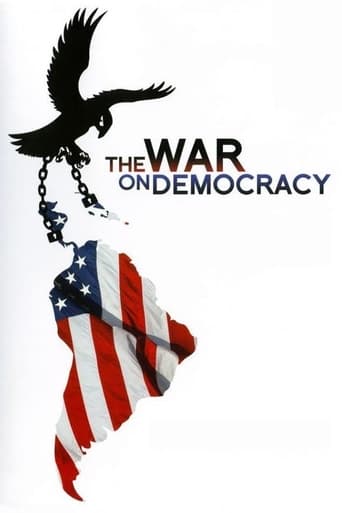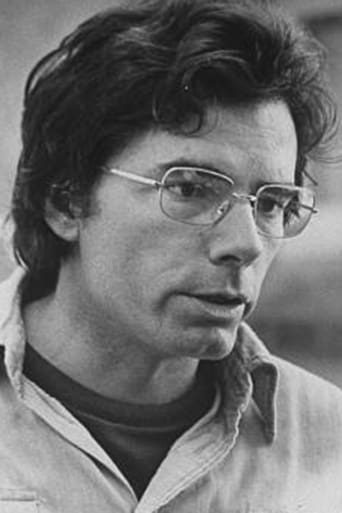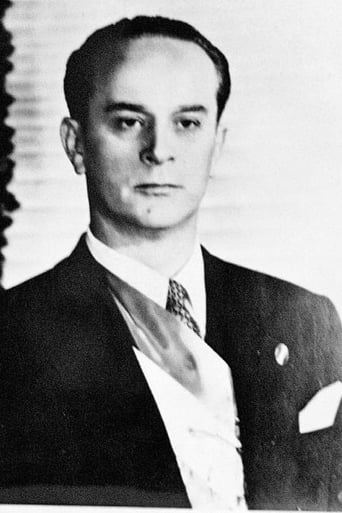

The War on Democracy (2007)
Set both in Latin America and the United States, the film explores the historic and current relationship of Washington with countries such as Venezuela, Bolivia and Chile. Pilger says that the film "...tells a universal story... analysing and revealing, through vivid testimony, the story of great power behind its venerable myths. It allows us to understand the true nature of the so-called "war on terror". According to Pilger, the film’s message is that the greed and power of empire is not invincible and that people power is always the "seed beneath the snow".
Watch Trailer
Cast
Reviews
How sad is this?
Boring
It's entirely possible that sending the audience out feeling lousy was intentional
Great example of an old-fashioned, pure-at-heart escapist event movie that doesn't pretend to be anything that it's not and has boat loads of fun being its own ludicrous self.
Democracy is one of the old-fashioned goods the U.S. have exported to developing countries. To quote President Bush: "America will not impose our own style of government on the unwilling. Our goal instead is to help others to find their own voice, attain their own freedom, and make their own way." Can it be so? Absolutely not. The reality has usually been the other way round. Democracy made in the U.S. is like Pandora box for tiny countries.The War On Democracy filmed by John Pilger shows well the falsity of the U.S. through the revelation of the hidden, suppressed history in Latin America.Don't be embarrassed at the fact that The U.S has tried to turn over democratic governments under the guise of democracy. Especially, many countries in Latin America have been attacked with the loss of countless lives, and their leaders became the victims of an injustice; Jacobo Arbenz, a democratically elected Guatemalan president in 1950, was forced into exile being stripped naked and photographed; In 1973 Salvador Allende of Chile took his life against the bombing led by General Pinochet, an America's man.By what right, has the U.S. played the leading role in destroying the democratic governments and the dreams of the people? Who gives the U.S. the right? Let's listen to the pretext of Duane Clarridge, head of the CIA's Latin American division in the early 1980s in Chile. "We'll intervene whenever we decide it's in our national security interests to intervene, and if you don't like it, lump it. Get used to it, world -we're not gonna put up with nonsense. If our interests are threatened, we're gonna do it." Philip Agee, C.I.A. agent 1967-68, also back up the Clarridge's excuse. "In the CIA, we didn't give a hoot about democracy. I mean, it was fine if a government was elected and would cooperate with us, but, if it didn't, then democracy didn't mean a thing to us, and I don't think it means a thing today." Like pilger's saying, it's evident no country has a right to go its own way, unless that way coincides with the interests of the United States.However, the U.S. tasted the bitterness of defeat on April, 2002 in Venezuela. The joint work of Washington and the wealthy of Caracas to get rid of President Chavez ended up failing due to people power demanding the return of their president. In spite of the planned coup, Chavez was put in the bosom of the people in 48 hours after being abducted.The people power was also brilliant in Bolivia. In 2000, to take backs the valuable resources like water, Bolivian people fought against a foreign consortium dominated by the American corporation Bechtel, and accomplished their hope. Furthermore, in 2005, the indigenous person, Evo Morales, was elected president for the first time ever.Of course, there sure is another plot of empire still going in Latin America, Middle East, Afghanistan, and Africa. However, the rising up against empire will never stop as long as the people power exists. As Hugo Chavez says, the world should be governed by the rule of law, equality, justice and fraternity, not by empire's greed.
The bottom line for John Pilger's WAR ON DEMOCRACY documentary = Go See It! Then you can talk about it.I am addressing these remarks in the first place to law-abiding people, as most sharply distinguished from war criminals. The definition of a crisis = a period in which, in order to abide by that law which serves justice only, one must be prepared to enforce it. This extraordinary duty occurs because the official agencies with their names in the upper case --DoJ, DoD & CIA, for example-- have been captured by a bloody tyranny which utterly perverts such basic political concepts as those of justice, defense and intelligence. (Spook HQ is now officially named the George Bush Center for Intelligence, which is located two doors down from the Wilt Chamberlain Home for Short People.) These general reflections very much pertain to the subject of Mr.Pilger's masterpiece.I speak Spanish and briefly represented the U.S. State Department in Chile in 1964 & '65. In its hour & a half, WOD covers Latin America from El Salvador to Chile with a focus on Venezuela led by Hugo Chavez and a stop in Bolivia. For those new to this continent, WOD's an absolutely essential introduction. For those who already know it (among the group whom I'm addressing, please remember), they will be overjoyed to see an intelligent and artistically coherent story of their homelands on the Big Screen. We're talking about a place more than twice the area of the USA with more than half a billion people, hundreds of millions of whom are dirt poor and many of whom have had relatives murdered by thugs trained by the US Army at the "School of the Americas", which has recently changed its name out of embarrassment.When Pilger says that the CIA puppet regime in Guatemala slew "thousands", he is grossly understating the case, since the best estimate's ~250,000. Naturally he spent more time in countries where it's safer to film. Once we understand that we should all bring everybody we know to see this movie, then we can acknowledge that it's an opening of the door to a vast realm. Many more such features need to be made even to begin to do justice to the material.A criticism: In discussion with a Chilean physician who was a torture victim, Pilger uses a phrase about being "ensnared in fascism". IMHO he should simply forget the F word. As a matter of historical fact, Benito Mussolini, who created the concept of Fascism and led that Party in national power for a quarter of a century, had a lot more going for him than did the traitor Generals Rios Montt of Guatemala or Augusto Pinochet of Chile, to name only two of the dozens of US puppets in the region. The CIA's Guatemalan Genociderals in particular in their atrocities by far exceeded any acts of repression which Il Duce ever carried out in Italy. In other words, from Ronald Reagan until now the U.S. Government gives Fascism a bad name. Anyone who wants to have a head's up 'tude toward such a big part of our human race will definitely want to check out John Pilger's well-informed portrait of the irresistibly rising forces of the Western Hemisphere. Alert supporters of Barack Obama, Ralph Nader and Cynthia McKinney will want to give thought to tying in WOD to their candidates' campaigns.OTOH white supremacists & jingoes who think that slaughtering the families of foreigners is still cool, especially if they themselves can get a piece of the financial action, well, such "Chicago boys" as SonnaBush calls them in WOD, they will pan Pilger's product as skillfully as they can manage.
I thought the scenes looked too set up for the camera. For example, the ladies learning to read and write. It seemed that thousands were missing out and only a few are getting any lessons 10 years into the Chavez regime. The shots of Pilger in the interview with the CIA guy - which are usually done when the interviewee has left the scene were really bad. Pilger used the shot of Chavez justifying why millions people live in barrios in such a rich country as "well they don't want to be millionaires - like Americans" and I was left thinking, Well if they educated them they might want more than what they have now" I couldn't see any advantages in sight for these people rely on populist dictators. It is no wonder they escape to Australia and America whenever they can. The film was basically a lot of anti-American slanging off with no hope of change, i.e. sharing the wealth, in store for the people. The countries in the film all go from one dictator to another much like Africa does these days since the end of colonialism and the people just survive. I would prefer to see a film on the subject made by a film maker from one of the countries mentioned. Pilger was very condescending, agreeing with anything the current dictator said. As it didn't include any comedy it only rates a 1 out of 10 from me.
John Pilger's first documentary for the cinema is also his most optimistic. When I sat down to watch it with an audience, I was wondering why Pilger had chosen this time to release a documentary for cinema when he's been doing this for television for so long. I think the optimism is the reason, the need to get that optimism across to a much broader audience than the one that views his television work. Recent work like "The Corporation", "The Yes Men", as well as the work of Micheal Moore, has shown a demand for this kind of non-fiction in the cinema and Pilger is following this trend. What this work has in common is need to critique US power, the different ways in which this manifests itself, and the effect it has on people all over the world.Here, Pilger focuses on Latin America, the source of much popular uprising in recent years with the arrival in Venezuala of President Hugo Chavez and the failed US-backed bid to overthrow him after he acknowledged and championed the poor at the expense of the rich minority whom (because of this) he had begun to make uncomfortable.Interestingly there is a lack of censorship shown in the Venezualan media which means attacks on the President and his policies are not only constant but almost violently vociferous. Perhaps the only failing in Pilger's examination of Venezuala (including a face-to-face interview with Chavez himself) is specifying where this opposition comes from, asides from the privileged minority in the country and US media and government officials.Pilger further examines other cases in Latin America, including El Salvatore, Guatemala and Chile, where US or US-backed suppression of social or political movements (often elected democracies) that oppose their involvement in these countries has led to poverty, torture and murder. Former CIA agents willingly admit on screen that if a government, democratic or not, was not co-operative with US power they were often under orders from the highest level to destroy or undermine such governments using any methods necessary. One such official, a former CIA chief called Duane Clarridge responsible for torture and murder of civilians in Chile, is so blatantly ignorant and unapologetic in his answers to Pilger's questions that his responses induced laughter in the audience I watched it with.Throughout all of this, Pilger features his usual interviewing of civilians caught up in, and often victims of, these various conflicts. Some of this is insightful but, like his use of music in some moments, can border on the emotionally manipulative. Also his early extensive emphasis on Venezuala means his coverage of the other countries feels abbreviated as a result. That said, most of the time Pilger gets it right and his interviews along with his readings of each country's history effectively communicate his message.Rather than despairing of the reality of what he depicts, Pilger instead offers hope for change in the will of the people never to be victimised and to continue to resist and challenge oppressive power - a change is a-coming and Latin America, like the rest of us, is right in the middle of it.


